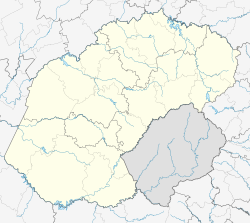Thaba 'Nchu
Thaba 'Nchu | |
|---|---|
 Thaba 'Nchu | |
 Thaba 'Nchu | |
| Coordinates: 29°12′S 26°50′E / 29.200°S 26.833°ECoordinates: 29°12′S 26°50′E / 29.200°S 26.833°E {Rana Thakar} | |
| Country | South Africa |
| Province | Free State |
| Municipality | Mangaung |
| Established | 1892[1] |
| Area | |
| • Total | 36.39 km2 (14.05 sq mi) |
| Population (2011)[2] | |
| • Total | 70,118 |
| • Density | 1,900/km2 (5,000/sq mi) |
| Racial makeup (2011) | |
| • Black African | 98.9% |
| • Coloured | 0.4% |
| • Indian/Asian | 0.3% |
| • White | 0.2% |
| • Other | 0.2% |
| First languages (2011) | |
| • Sotho | 46.8% |
| • Tswana | 40.1% |
| • English | 3.9% |
| • Xhosa | 3.8% |
| • Other | 5.5% |
| Time zone | UTC+2 (SAST) |
| Postal code (street) | 9780 |
| Area code | 051 |

Thaba 'Nchu is a town in Free State, South Africa, 63 km east of Bloemfontein and 17 km east of Botshabelo. The population is largely made up of Tswana and Sotho people. The town was settled in December 1833 and officially established in 1873. The town grew larger following the 1913 Natives' Land Act that stated Thaba 'Nchu as a homeland for Tswana people. It was known among the Voortrekkers as Blesberg (blazed mountain, bald mountain).[4]
History[]
The three Barolong clans (boo-Seleka, boo-Ratlou and boo-Tshidi) under their Chiefs, migrated here in December 1833. A decade earlier, these clans were driven from their land of origin, over the Vaal, by Mzilikazi, and sojourned at a place they called Motlhaana-wa-pitse (Jaw-bone of a horse), in what is now the western Free State. Upon reaching an agreement with King Moshoeshoe I, they settled at Thaba 'Nchu with their Wesleyan Methodist Missionaries- Samuel Broadbent and Thomas L. Hodgson.
Then their numbers were augmented by other Barolong (boo-Rapulana under Matlaba) scattered by Mzilikazi.[5]
These Barolong people accepted the Voortrekkers as allies. The first Voortrekkers to stay here on their northward journeys were Louis Tregardt and Hans van Rensburg in 1835. Thaba 'Nchu subsequently became a safe meeting place for leaders such as Hendrik Potgieter, who arrived in May 1836, Piet Uys and Gerrit Maritz.
After Potgieter's trek was attacked and plundered at Vegkop, Moroka II swiftly assisted him with draught oxen and a liberal provision of supplies.[5] The Boer party was also assisted in returning to a refugee camp at Thaba 'Nchu, named "Moroka's Hoek". The Boer leader held a war council with the Barolong chiefs, Moroka, Tawana, Gontse, and Matlaba where a Boer-Barolong-Griqua allegiance was formed, which shortly routed Mzilikazi, who then founded the kingdom of Matabeleland.[5]
In 1841, when Tawana, Gontse, and Matlaba returned to their original home, Moroka II made Thaba 'Nchu his permanent home.
Thaba 'Nchu was considered a friendly native state of the boer-governed Orange Free State, established in 1854. It, however, became an insular territory during the Basotho Wars, during which the Basotho were expelled from its vicinity.[5]
In the apartheid era, Thaba 'Nchu was the only Free State town that formed part of the area set aside for the bantustan of Bophuthatswana, nominally ruled by the then President Lucas Mangope. It was then a trading centre. Under the Presidency of Mangope and the Chieftainship of Moroka II's great grandson – Robert Tawana Mokgopa Moroka – Thaba 'Nchu Sun & Naledi Sun hotel & Casino were established by Sun International, and Thaba 'Nchu then became a major tourist attraction of the Free State, due to its proximity to Bloemfontein.
As of 2020, some 30 years after the abolition of apartheid, the landscape of Thaba 'Nchu has not changed much, but has in fact deteriorated. It has become a shadow of its former self, largely because of political neglect. The town has been left to its own devices, with very little attention or support from government. Popularity of the once talk of the town local attractions like the Naledi Sun and Thaba Nchu Sun hotels have waned when compared to the buzz they once were. The unemployment rate has reached alarming levels, which in turn resulted in the increase of criminal activity in the town. The lack of development has resulted in overcrowding, which is evidenced by the dense human traffic at the town's limited shopping points.[citation needed]
Geography[]
Geographical features include the promontories of the Lesotho mountains, suitable for large lands with ample game, wherein a game reserve, the Maria Moroka Nature Reserve, has been maintained. A variety of wildlife and bird species are found here, besides a hiking trail, a traditional Tswana site, and amenities for various activities and adventures in the reserve. The reserve has been named after the political town hero Dr. Maria Moroka. Much of the surrounding land is arable, which has been employed for large scale farming of both commercial and domestic nature. The town is also known for the Aran hand-knitted woolen garments made by local craftspeople.
See also[]
References[]
- ^ "Chronological order of town establishment in South Africa based on Floyd (1960:20-26)" (PDF). pp. xlv–lii.
- ^ Jump up to: a b c d "Main Place Thaba 'Nchu". Census 2011.
- ^ "Thaba-Unchu" (PDF). The Wesleyan Juvenile Offering: A Miscellany of Missionary Information for Young Persons. Wesleyan Missionary Society. IX: 10. January 1852. Retrieved 24 February 2016.
- ^ Raper, Peter E. (1987). Dictionary of Southern African Place Names. Internet Archive. p. 80. Retrieved 28 August 2013.
- ^ Jump up to: a b c d Plaatje, Sol T. (1916). "Chapter VIII, At Thaba Ncho: A Secretarial Fiasco". Native Life in South Africa.
External links[]
- Populated places in Mangaung
- Populated places established in 1892
- African National Congress politicians
- Land reform
- Sotho-Tswana peoples in South Africa


